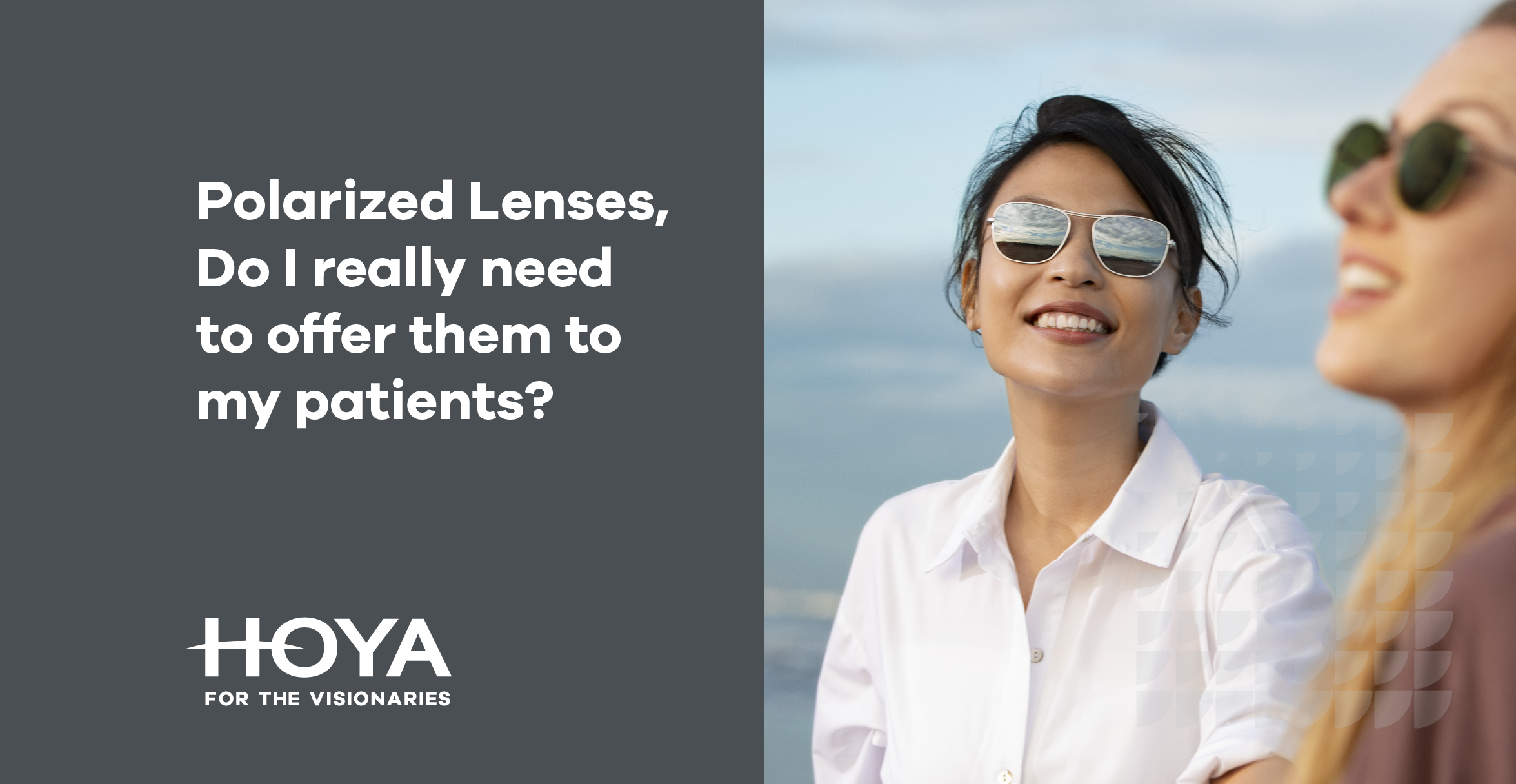Most of us are familiar with polarized sun lenses. But it is surprising how few people understand the technology behind these premium lenses and why polarized lenses can be safer, more comfortable and offer a superior value over a regular sun lens.
Basics about sunlight—and reflections
To fully understand the benefits of polarized lenses, it’s important to know a little about how sunlight behaves and why it sometimes causes glare, discomfort and reduced visibility.
Sunlight travels to Earth in the form of waves. But unlike waves of ocean water that have a relatively common (horizontal) orientation, light waves are much more random and travel in all directions. If all light waves had the same directional orientation, this would increase the intensity of sunlight to an unbearable, blinding level.
On a smaller scale, this is what happens when sunlight strikes a flat, reflective surface. The light waves that bounce back from such a surface are more uniform in their orientation than direct sunlight. This causes the reflected light to be much more intense than the brightness of surrounding objects.
Regular sunglasses help a little...
Regular sunglasses reduce reflective glare to some degree, but tints in regular sunglass lenses treat direct (randomly oriented) light rays and reflected (more aligned and intense) light rays equally.
So bright, reflective “hot spots” that affect your vision and comfort remain, even if they are a bit less intense.
...Polarized lenses are better
Only polarized sunglass lenses have the technology required to selectively reduce the brightness of reflected light rays to a greater degree than the brightness of surrounding objects. By doing so, bright reflections are minimized for a more uniformly illuminated visual field—which means greater comfort and better visibility.
In addition to having a tint that reduces overall brightness, polarized sun lenses have a special filter incorporated into the lens material. This thin film is chemically and mechanically engineered to absorb and filter light waves of a specific wave orientation that matches the orientation of most of the rays reflecting from flat, horizontal surfaces—such as the road, oncoming vehicles, or a body of water.
Specific benefits of polarized lenses include:
-
Safer driving vision due to better visibility and less eye fatigue
-
Fewer headaches from eye strain and squinting in bright sunlight
-
Enhanced visual experience for most outdoor sports and activities
-
Superior eye protection for sports (with Phoenix™ polarized lenses)
-
More enjoyment of fishing and water sports due to better visibility
-
100 percent protection from the sun’s harmful UV rays
Polarized lenses and snow. Really?
We live in Canada and snow is a part of our lives and protecting eyes from the sun is just as important in winter as it is in summer.
Most people are aware that sun lenses should block the sun’s ultraviolet (UV) rays but for maximum eye protection, they should also shield the eyes from high-energy visible blue rays (HEV). We commonly refer to HEV as blue light and this contributes to visual haze and glare.
Winter Weather Facts:
- Weather conditions can change quickly in winter—grey mornings often are followed by bright sunny afternoons that can be harmful to unprotected eyes. Trees have dropped their leaves, leaving less shade to protect the eyes from direct sunlight.
- The sun’s damaging UV and HEV rays can penetrate clouds, so sunglasses are important on overcast days, too.
- Because the sun is lower in the sky in winter, drivers often face high glare situations, with the sun shining directly into their eyes.
- Snow sports enthusiasts especially need protective sunglasses because they spend many hours in conditions of high UV and HEV exposure.
- Exposure to the sun’s UV and HEV rays is increased in winter because snow reflects significantly more solar radiation than grass, sand or pavement. Snow reflects approximately 80 percent of the sun’s UV rays, compared with grass, soil or water, which reflect less than 10 percent, and sand that reflects about 20 percent.
- The eye is very susceptible to UV and HEV damage, and too much winter sun can cause both short-term and permanent vision problems, including photokeratitis and cataracts.
The Ultimate Solutions?
HOYA’s NEW Mirrored Polarized Lenses
HOYA’s Mirrored Polarized lenses offer a level of health protection that other sun lenses simply cannot match.
In addition to the benefits listed for regular polarized lenses, they offer enhanced performance, glare reduction and style. They help protect against harmful UV and HEV light that may cause serious eye conditions found with prolonged exposure.
HOYA’s Mirrored Polarized lenses not only offer effective UV filtration to protect the eyes, but also to protect the delicate skin surrounding the eyes.
Go polarized today
Remind your patients that sun lenses block UV and HEV and everyone in the family should wear them — whether for work, play, sports, driving or a casual step outside. Help your patients see better, and for longer. Never hesitate to offer visual solutions that provide more comfort, clarity and safety outdoors.

